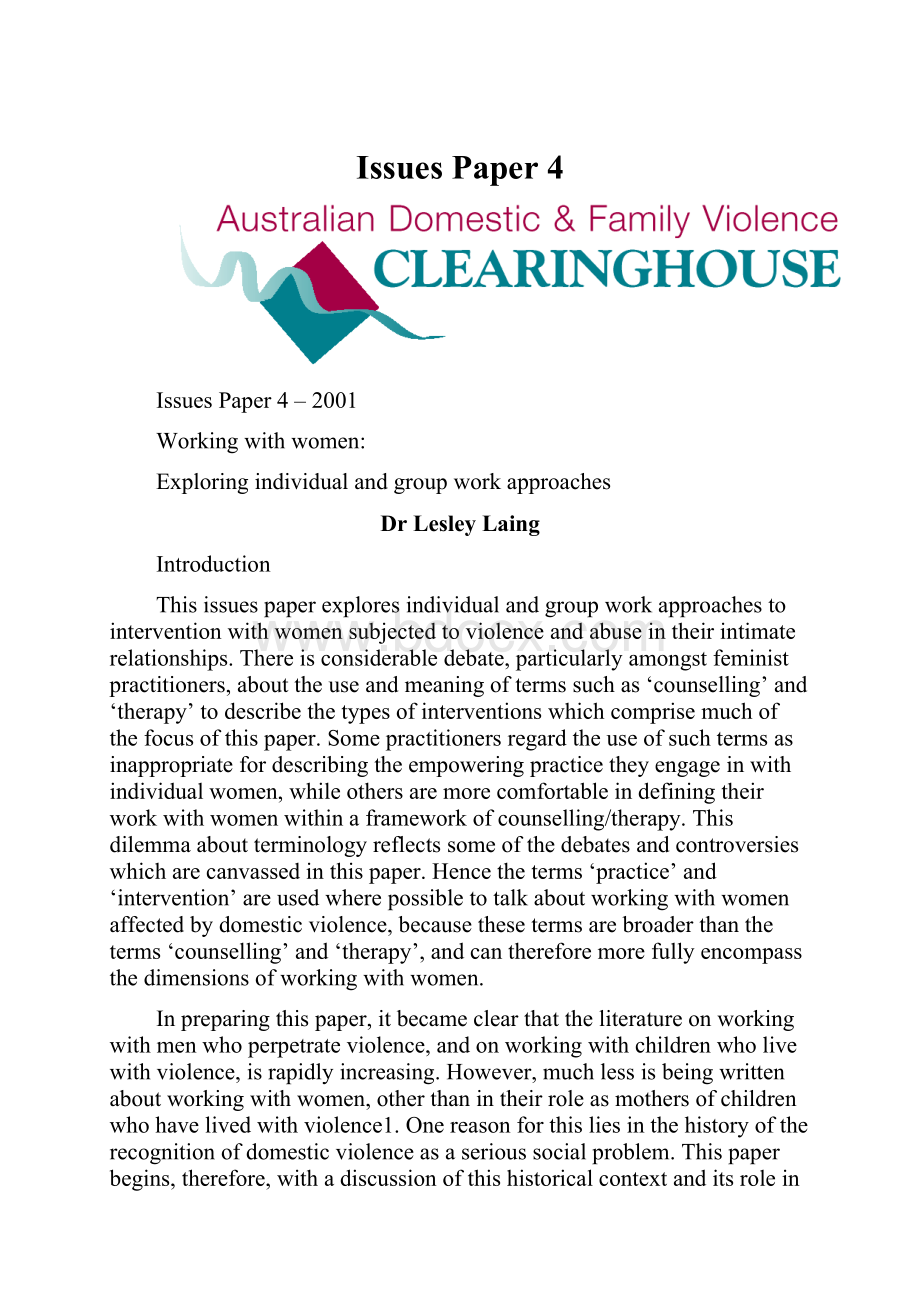Issues Paper 4.docx
《Issues Paper 4.docx》由会员分享,可在线阅读,更多相关《Issues Paper 4.docx(45页珍藏版)》请在冰豆网上搜索。

IssuesPaper4
IssuesPaper4–2001
Workingwithwomen:
Exploringindividualandgroupworkapproaches
DrLesleyLaing
Introduction
Thisissuespaperexploresindividualandgroupworkapproachestointerventionwithwomensubjectedtoviolenceandabuseintheirintimaterelationships.Thereisconsiderabledebate,particularlyamongstfeministpractitioners,abouttheuseandmeaningoftermssuchas‘counselling’and‘therapy’todescribethetypesofinterventionswhichcomprisemuchofthefocusofthispaper.Somepractitionersregardtheuseofsuchtermsasinappropriatefordescribingtheempoweringpracticetheyengageinwithindividualwomen,whileothersaremorecomfortableindefiningtheirworkwithwomenwithinaframeworkofcounselling/therapy.Thisdilemmaaboutterminologyreflectssomeofthedebatesandcontroversieswhicharecanvassedinthispaper.Hencetheterms‘practice’and‘intervention’areusedwherepossibletotalkaboutworkingwithwomenaffectedbydomesticviolence,becausethesetermsarebroaderthantheterms‘counselling’and‘therapy’,andcanthereforemorefullyencompassthedimensionsofworkingwithwomen.
Inpreparingthispaper,itbecameclearthattheliteratureonworkingwithmenwhoperpetrateviolence,andonworkingwithchildrenwholivewithviolence,israpidlyincreasing.However,muchlessisbeingwrittenaboutworkingwithwomen,otherthanintheirroleasmothersofchildrenwhohavelivedwithviolence1.Onereasonforthisliesinthehistoryoftherecognitionofdomesticviolenceasaserioussocialproblem.Thispaperbegins,therefore,withadiscussionofthishistoricalcontextanditsroleinshapingideasabouttheroleofcounselling/therapyinresponsestowomensubjectedtoviolenceintheirintimaterelationships.
Therecognitionofdomesticviolenceasaserioussocialproblemisanachievementofsecondwavefeminism,asocialmovementoriginatinginthelate1960sandearly1970s.Feministactivistsprovidedsafetyandshelterforwomenandchildrenescapingviolence,andlocatedtherootsofdomesticviolenceingenderinequalityinsocialrelationships.Thisformulationchallengedtheexistingmedicalmodelwhichlocatedthecausesofdomesticviolencewithinthepathologyofindividualmenandwomen.Fromafeministperspective,womenescapingviolencewereinneed,notofcounsellingortherapy,butoflegalredressforcrimescommittedagainstthem,andofaccesstoincomesupport,housingandotherresourcestoenablethemtoestablishlivesfreeofviolenceandabuse.Thelongertermsolutionstoviolenceagainstwomenlayinthereformofgenderrelationsandmeasuresthatfosteredwomen’ssocialandeconomicautonomy.
Giventhishistoricalcontext,reservationsaboutthecontributionofcounsellingortherapytoworkingwithwomen,areunderstandable.Carlson(1997)identifiesfourconcernsunderlyingthesereservations.Firstly,offeringcounsellingmayimplythatthewomanhaspre-existingpersonalitydeficitswhichsomehowcontributedtohervictimisation.Hencethereisadangerthatcounsellingresponsesmayperpetuatevictim-blamingandobscuretheresponsibilityofperpetrators.Secondly,manywomenreportjudgementalandunhelpfulcontactswithmentalhealthandothertherapeuticserviceproviders.Thirdly,theinherentpowerimbalanceinthetherapeuticencounterreplicatesthepowerimbalanceintheabusiverelationship,andthuscreatesaproblematiccontextforfacilitatingempowerment.Finallyitisarguedthatthefocusofeffortstoaddressdomesticviolencemustbeonchangingthesystems–economic,health,legalandwelfare–whichfailtoprovideabusedwomenandchildrenwiththeresourcestheyrequiretolivesafely.
Analternativeviewisthatlivingwithabuseandviolenceunderaregimeofcoercivecontrolcanhaveseriouseffectsonwomen,andthatcounsellingcan
playaroleinassistingwomentoovercometheseeffects(Styles,1991).ThisviewissupportedbytwoAustralianresearchprojectswhichexploredtheneedsofwomenaffectedbydomesticviolence(Bagshaw,Chung,Couch,Lilburn,&Wadham,2000;KeysYoung,1998).Bothfoundthatwomenexpressedaneedforemotionalsupport,toassistinovercomingtheimpactoftheirexperiencesofabuse.
Peopletellstoriesdifferently,atdifferentstagesoftheirexperience.Icantalktoyouaboutthisnowwithoutshaking.ButIcouldn’thavedonethisayearagowithoutshaking.Ineededspecialisthelp.Ineededtotrustpeopleagain.(survivorcitedinKeysYoung,1998,p.61)
Itisimportanttonotethatthesharingofexperiences,andthelinkingofwomen’sexperienceswiththeexperiencesofotherwomen,wasanimportantpartoftheworkofthewomen’srefugemovement.Forthefirsttimewomenwereabletotalkabouttheabuseandviolationtowhichtheyhadbeensubjected,tobelistenedto,tobebelieved,andtofindthattheywerenotalone.Inthisapproachlaythefoundationsofgroupwork,whichcontinuestobebyfarthemostcommonformofinterventionwithwomenaffectedbydomesticviolence.
Itisnowrecognisedthatlivingwithviolence,abuseandcontrollingbehaviourscanseverelyimpactonwomen’smentalhealth(Herman,1992;Laffan,2001;Roberts,Lawrence&Williams,1998).Inordertoaccessassistanceforwomen,refugesareincreasinglyattemptingtodeveloplinkswithmentalhealthservices,althoughthedifferent‘cultures’ofeachservicesystemcanpresentformidablechallengestodevelopingapproacheswhichmeettheneedsofabusedwomen(Incoll,2000;Shelton-Bunn,2001).
Itappearsthen,thattheissueislessaboutwhetherornotthereisaroleforcounselling/therapy,thanaboutthetypeofpracticewhichisengagedinwhenworkingwithwomen,whetherthiscontactwithwomeniscalled‘counselling’,‘therapy’,‘support’,or‘advocacy’(atermwidelyusedintheUnitedStates).PracticeinworkingwithwomenneedstoavoidthepitfallsidentifiedbyCarlson:
‘pathologising’thewoman,assumingthat‘counselling’aloneisasufficientresponsetodomesticviolence,orfailingtolocateresponsibilityfortheviolencewiththeperpetrator.Avoidingpitfallsuchastheserequiresawarenessofthevaluesandperspectivesunderlyingandinformingpracticesinworkingwithwomen.
Thebroaderemphasisonpracticeandtheattentiontothevaluesandperspectivesunderlyingthispractice,makeitpossibletoincludeinthisdiscussionotherimportantdimensionstoworkingwithwomenaffectedbydomesticviolence.Forexample,manyserviceproviderswhocomeintocontactwithabusedwomen,whilenotinaformalorstructured‘counselling’role,canneverthelessplayaninvaluable
roleincounteringtheself-blameandisolationimposedbytheperpetrator.Thisisseeninastudyofabusedwomen’scontactwiththehealthsystem.Gerbertetal.(1999)identifiedtheimportancetothewomenofinteractionscharacterisedbyanon-judgementalattitudeandcaringmanneronthepartofthehealthcareprovider:
Thewomen...describedhow(withorwithoutdirectidentificationordisclosure)validationfromahealthcareproviderhad“plantedaseed”,leadingtoturningpointsorepiphaniesintheirrelationshipswiththeabusers.Validationservedtoslightlyshifttheirmentallandscape,whichintimehelpedthemtoseetherelationshipandthemselvesdifferently.(Gerbertetal.,1999,p.130)
Suchinterventionscaninfactbeveryinfluentialinawoman’sunderstandingofissuesofresponsibilityandinherassessmentofpotentialresourcesinherattemptstodealwiththeviolenceshefaces.
Centraltothedebateaboutpracticewithwomen,isthefactthatdomesticviolenceisatthesametime,bothapersonalproblemandasocialissue:
Becauseviolenceagainstwomenissodeeplyembeddedintheinstitutionalfabricofsociety,wifeabuseisbothasocialproblemandapersonalissue,asitisperpetratedbymenagainstwomenintheirsociallocationsaswivesand/orintimatepartners.Asasocialproblem,itcanbeviewedasapointofconvergenceofbroaderpatternsofeconomic,social,andpoliticaldiscriminationagainstwomen.(Lempert,1996,p.269)
Thisraisesdilemmasanddebatesaboutatwhichlevel–theindividualorthesocial–tobestfocusourinterventions.Doesworkingwithindividualwomenre-privatiseandhidetheissueofdomesticviolenceasasocialproblem?
Ontheotherhand,doeschangeatthesocialandpoliticallevelreachdowntoimprovethesituationofindividualwomen?
Thewomen’srefugemovementdevelopedaformofinterventionwhichencompassedbothlevelsofintervention,capturedsuccinctlyintheslogan:
‘thepersonalispolitical’.AsWensingexplains:
‘…weseeourworkinthecommunityasbeingasimportantasourworkwithinservices.’(2001)
Dilemmasaboutthelevelatwhichtofocusinterventiondonotjustarisewithrespecttocounsellinginterventions.Similardilemmashavebeenidentified,forexample,withlegalinterventionssuchas‘evidencebased’or‘nodrop’prosecutions2wherecriminalproceedingsagainstaperpetratorofviolencemayproceedagainsttheexpresswishesofthewoman.WhilesomesupportsuchpoliciesonthegroundsthattheyensurethattheStatetreatsdomesticviolenceasaseriouscrime(socialchange),othersarguethatsuchpoliciesaredisempoweringtoindividualwomenandincreasethedangertowomenfromdisadvantagedsocialgroups(Mills,1999).
MelanieShepard(1999,p.120)fromtheDuluthprogramprovidesanexampleofthistensionbetweendifferentlevelsofintervention:
‘Advocateshavearguedforpolicyreforms(e.g.,prosecutionofcases)onlytoturnaroundandaskforexceptionsforindividualbatteredwomen.’
Thenextsectionofthisissuespaperoutlinessomecompetingviewsaboutwomenwhoexperience